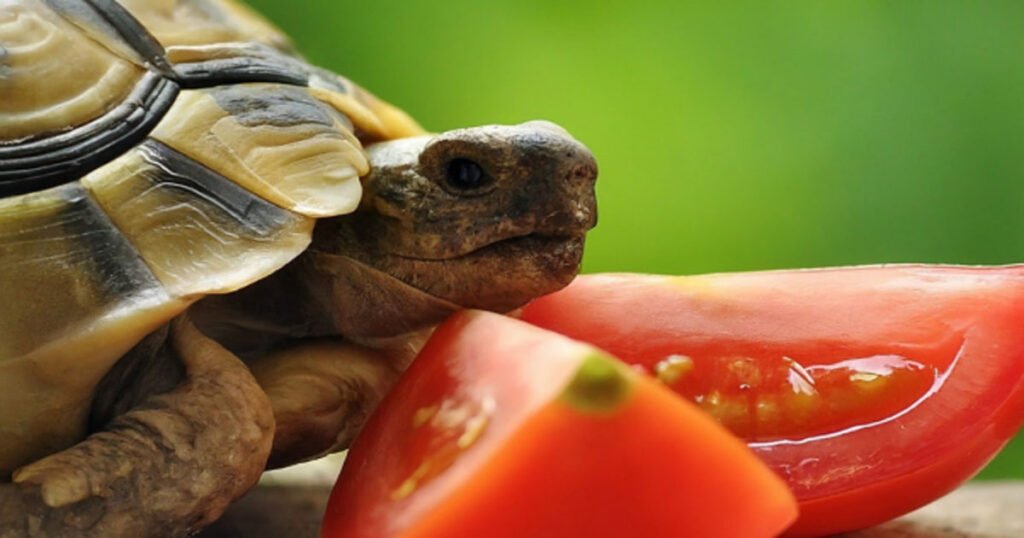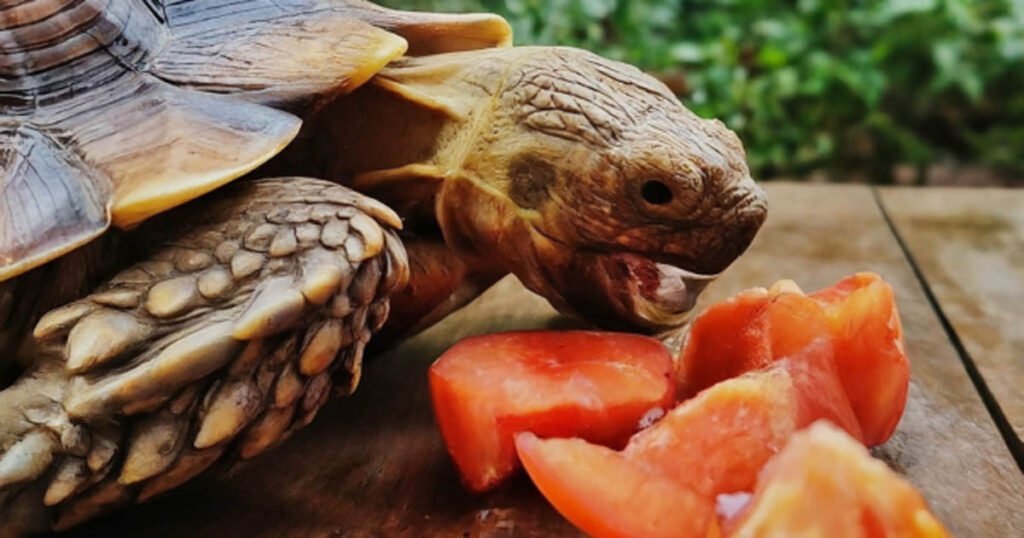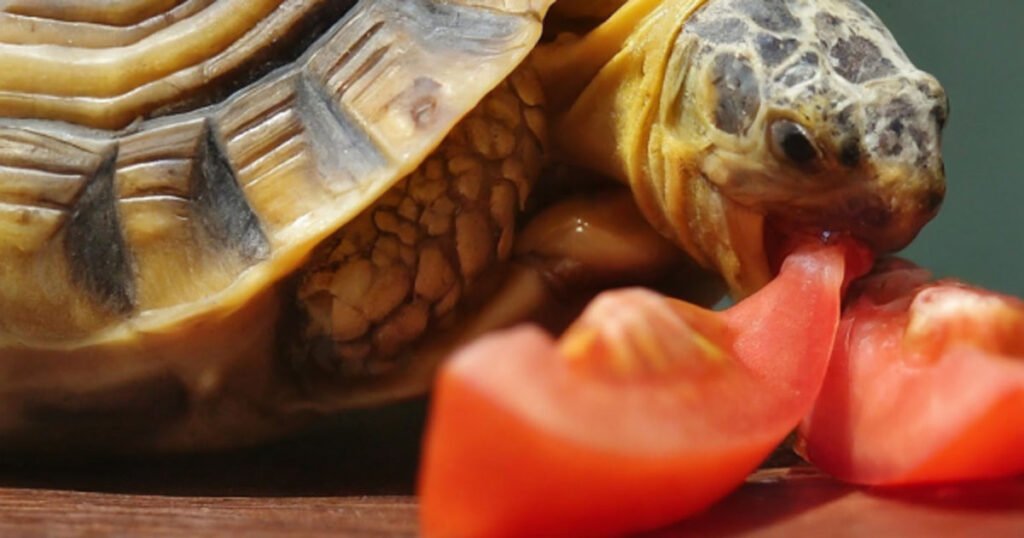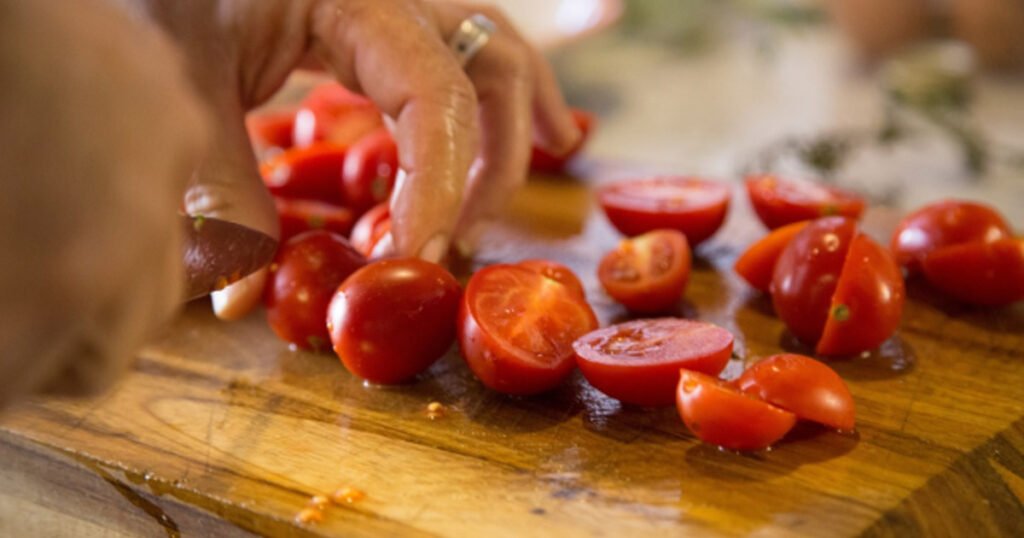When it comes to pet ownership, turtles are gaining popularity for their unique charm and unhurried movements. As a turtle pet owner, you might find yourself thinking about a common question: Can turtles eat tomatoes? Turtles are omnivores, so they enjoy a diet that includes both plant and meat-based foods.
Having said that, they relish fruits, veggies, leafy greens, etc. But fruits should be given to turtles in moderation, because of some fruit’s nutrient ingredients. An excessive amount of those ingredients may cause health issues.
Turtles’ interesting dietary preferences make them even more maintenance-friendly. In order to keep turtles healthy, you have to know about their nutrition. In this post we will dig into the question “Can turtles eat tomatoes?” or are tomatoes safe for them? Find out if tomatoes can add flavor to your turtle’s menu, understand the details of their omnivorous appetite, and keep them happy and healthy.
Table of Contents
Can Turtles Eat Tomatoes: The Answer

The answer is yes, turtles can eat tomatoes, but with a few important considerations. Turtles, being omnivores, eat a diverse diet, and tomatoes can be tasty for them. However, it’s crucial to stick to ripe red tomatoes. Green tomatoes, leaves, and vines are a no-go – they can be harmful. The green parts like leaves, vines, tomato itself can be poisonous to turtles. While turtles can have tomatoes, moderation is key due to their relatively high sugar content, which can lead to digestive issues.
How Healthy Or Safe Are Tomatoes For Turtles?
Yes, tomatoes are considered safe, healthy, and even enjoyable for turtles. Veterinary sources indicate that turtles can relish tomatoes as part of their diet, categorizing them as a safe fruit. However, it’s crucial to follow recommended guidelines for fruit portions in an adult omnivorous turtle’s diet.
While tomatoes can contribute to a turtle’s overall health when given in moderation, don’t give only tomatoes as the whole fruit part. To get a balanced diet, you should provide a variety of fresh fruits in a reasonable quantity. Keep in mind that different turtle species may have specific dietary needs, so consulting your veterinarian for tailored care advice is essential.
What Nutrition Makes Tomatoes Healthy for Turtles?

Now that we know turtles can eat tomatoes let’s see how they’re nutrient-dense.
Tomatoes: A Nutritious Addition:
Nutritional Benefits for Pet Turtles: Tomatoes can be a nutritious addition to your turtle’s diet, even though they’re not a staple food. In addition to offering essential nutrients, tomatoes boost your shelled friend’s health.
Tomatoes as a Source of Vitamins and Minerals: Tomatoes are rich in vitamins and minerals. From vitamin C supporting the immune system to vitamins A and K maintaining vision and bone health, tomatoes offer a diverse array of nutrients. The inclusion of minerals like potassium and manganese further enhances the nutritional profile, promoting a healthy and happy turtle.
Key nutritional information: A closer look at the nutritional composition of ripe, raw red tomatoes per 100 grams has significant insights. With a high water content and moderate levels of carbohydrates, sugars, and essential nutrients, tomatoes offer a well-rounded nutrient package for turtles.
Water content and its Significance: Tomatoes’ significant water content contributes to hydration, complementing your turtle’s water intake. Water needed in turtles’ lives is crucial, so tomatoes’ water content is good for them.
Vitamins and Minerals in Tomatoes: Vitamin C, A, and K in tomatoes: Tomatoes boast a rich vitamin profile, featuring immune-boosting vitamin C, vision-maintaining vitamin A, and bone-supporting vitamin K. These nutrients contribute to turtle health and well-being.
Minerals Support Turtle Health: Beyond vitamins, tomatoes contain minerals crucial for turtle health. The combination of calcium, vitamin K, and manganese plays a vital role in maintaining strong bones and supporting proper organ function. Acknowledging these minerals reinforces your commitment to providing a well-rounded diet.
Antioxidants in tomatoes: Tomatoes are rich in antioxidants. Antioxidants protect your turtle’s cells with the ultimate goal of ensuring longevity and vitality. It helps turtles against free radicals, so they can be taken care of more proactively
Lycopene is a standout antioxidant. These antioxidants protect turtle cells from damage caused by harmful free radicals. Lycopene’s cellular benefits add a whole new level of appreciation for tomatoes.
Moderation is the key
The Role of Tomatoes as Occasional Treats: Although turtles can have tomatoes, moderation is key. Tomatoes should be considered occasional treats rather than a main food. This approach ensures that your pet receives a balanced and varied diet, meeting all nutritional requirements.
Is There Any Potential Risk of Tomatoes for Turtles?

If you feed your turtle too much tomatoes, is there any risk? Yes, there is. The following issues can happen if turtles consume too much tomato.
Sugar Content: Preventing Digestive Discomfort
It’s true that tomatoes add sweetness to a turtle’s diet, but their natural sugars, like other fruits, should be avoided. Tomatoes, being relatively high in sugar, can lead to digestive upset and discomfort if consumed excessively. To prevent digestive issues, it’s important to offer tomatoes in controlled quantities. Turtles shouldn’t get too much sugar, so offer tomatoes in moderation if you’ve got an excessive sugar intake.
Calcium & Phosphorus Balance
The calcium-to-phosphorus ratio is important for bone health when looking at a turtle’s diet. Turtles enjoy tomatoes, but they contain more phosphorus than calcium. Ensuring robust shell and bone health requires a balanced calcium-to-phosphorus ratio. Ideally, calcium should constitute 60-67% of the phosphorus content, while phosphorus should make up 33-40% of the calcium content.
Having too much phosphorus can cause calcium depletion from bones, causing brittleness and metabolic bone disease. If you feed your turtle a diet high in phosphorus and low in calcium, it may cause kidney or parathyroid problems in the long run.
Oxalates in tomatoes: Potential Risks
Tomatoes contain oxalates (comes from oxalic acid), substances that interfere with calcium metabolism. Moderate amounts of oxalates are acceptable, but too much can lead to kidney stones in turtles.
How Should You Feed Tomatoes To Your Turtle?

Feeding tomatoes to your turtle is a straightforward process, ensuring they receive nutritional benefits without adverse effects. Follow these guidelines to add tomatoes safely into your turtle’s diet:
1. Ripe Tomatoes: You must give ripe-red tomatoes to turtles. Avoid green tomatoes, tomato leaves, or stems as they may contain higher solanine levels.
2. Thorough Washing: Before serving tomatoes, wash them thoroughly to remove any potential pesticides or contaminants. It provides a clean and safe meal for your turtle.
3. Right Slice: Slice or dice the tomatoes into bite-sized pieces. This not only makes it easy for your turtle to eat and swallow but also reduces the risk of choking. However, you can also serve whole tomatoes.
How Much Tomatoes Should Be Given To Turtles?
Tomatoes should be considered as a treat or supplement in your turtle’s diet. The amount should be approximately 10% of their overall food intake. This means tomatoes should be offered occasionally, not as a daily meal. The specific quantity depends on your turtle’s size and species. Start with a small portion, like a few slices or cubes, and monitor their response. If your turtle enjoys tomatoes without digestive issues, you can continue incorporating them into their diet. Always consult your veterinarian for personalized dietary guidance.
FAQ
Can box turtles eat tomatoes?
Absolutely! Box turtles can enjoy ripe, red tomatoes as part of their diet. It’s essential to provide them with ripe tomatoes, avoiding raw or green ones. Also, any green part of tomato plants like leaves, and stems must be avoided, as they can be poisonous to turtles.
Can red eared slider turtles eat tomatoes?
Red-eared slider turtles can indeed enjoy tomatoes as part of their diet. These vibrant little sliders consider tomatoes a tasty and normal part of their meal plan.
Can aquatic turtles eat tomatoes?
While tomatoes might not be a staple in the wild diet of aquatic turtles, a small occasional treat is generally fine. Aquatic turtles should be given veggies in their meal. However, a little red tomato piece now and then can add a tasty variation to aquatic turtles.
Read More: How Long Can a Turtle Live Without Food
Conclusion
In conclusion, the answer to the question “Can turtles eat tomatoes?” is a positive one. These shelled companions can indeed enjoy ripe, red tomatoes. While they offer a tasty addition to your turtle’s diet, the important thing lies in balance. Tomatoes should be seen as a special treat, comprising around 10% of meals. Keeping an eye on their response and consulting with your veterinarian for dietary advice ensures a happy and healthy experience for your turtle. So, feel free to share this juicy delight with your turtle friend, but remember – balance is the key to a well-rounded diet!
